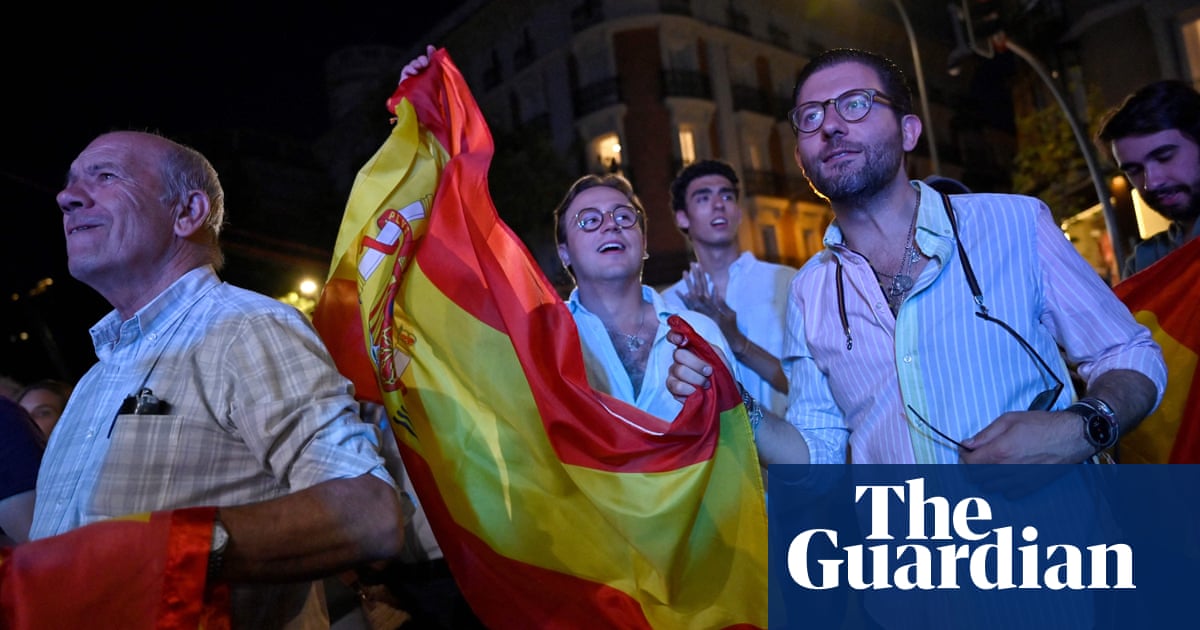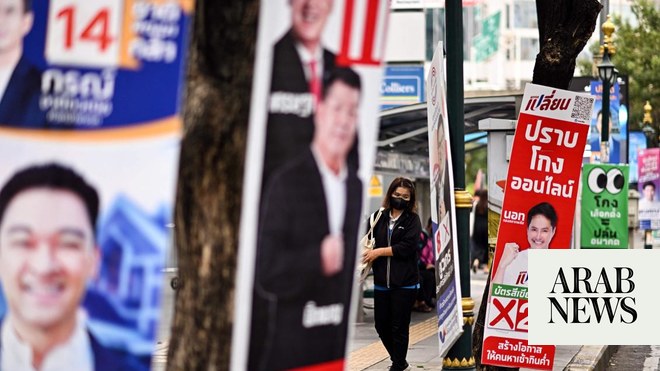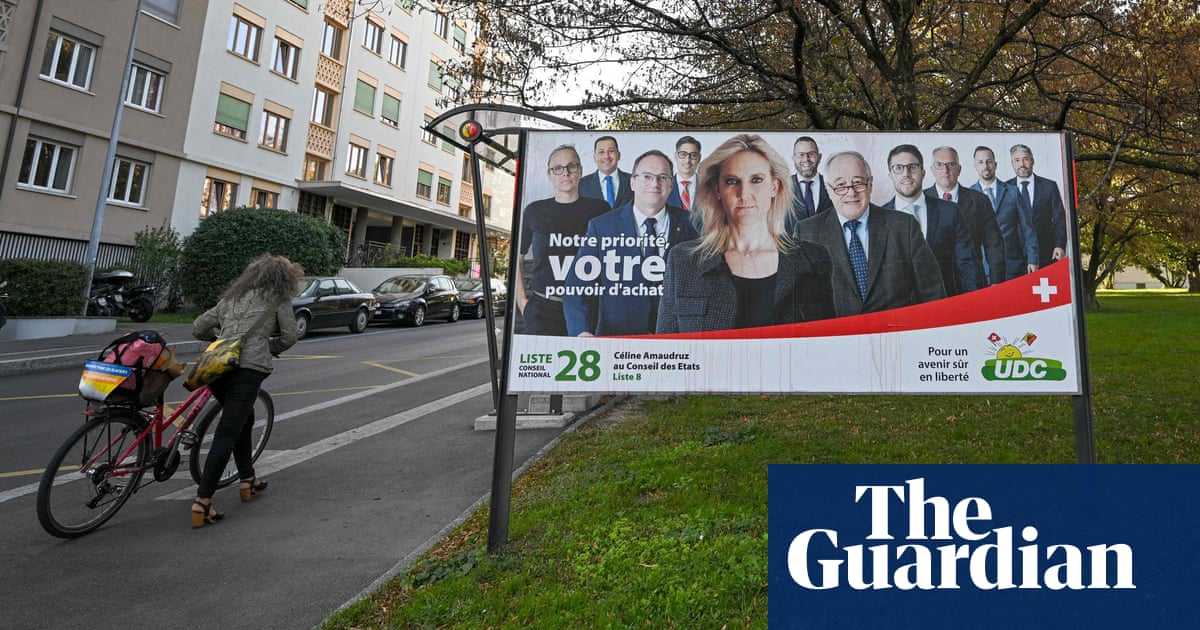
Spain’s opposition conservative party has won a narrow victory over the ruling socialists but looks unlikely to secure a rightwing majority after a snap general election that had raised fears of the far right entering government for the first time since the country returned to democracy after General Franco’s death five decades ago.
Although the polls had consistently predicted that the opposition conservative People’s party (PP) would cruise past the Spanish Socialist Workers party (PSOE) to secure an emphatic win in Sunday’s election, early results quickly established that the race was going to be much tighter.
By 1am local time, with 100% of the vote counted, the PP had won 136 seats to the PSOE’s 122. The conservatives’ potential coalition partners in the far-right Vox party had taken 33 seats – well down on the 52 they picked up in the last election – and PSOE’s allies in the new, far-left Sumar alliance were in fourth place with 31 seats.
Most polls and early projections had forecast that, despite its victory, the PP would fall short of the absolute majority of 176 seats needed in Spain’s 350-seat congress, and would seek to form a coalition government with the far-right party. Such an alliance would make Spain, which has just assumed the rotating EU presidency, the newest addition to the growing club of European countries where the far right has moved from the fringes into the mainstream – and often into power.
But the count showed that the political hue of the next government is far from a foregone conclusion, with the left and right blocs running almost neck and neck in their race to get as close to 176 seats as possible. As Monday approached, the PP and Vox had secured 169 seats to the PSOE and Sumar’s 153, suggesting Spain is in for weeks of negotiating and horse-trading as the rival camps explore their options for government.
Pedro Sánchez, Spain’s prime minister – who gambled on the snap election after the PSOE suffered a drubbing in May’s regional and municipal elections, had billed the poll as a stark choice between the forces of progress and the forces of reactionary conservatism. He had argued that only the PSOE and the Sumar alliance, which includes Podemos and is led by his deputy prime minister and labour minister, Yolanda Díaz, could defend and deliver the progressive agenda he has pursued over the past four years.
Speaking late on Sunday night, the PP’s leader, Alberto Núñez Feijóo, thanked those who had helped his party to victory and said he intended to try to form a government as soon as possible.
“Our duty now is to stop a period of uncertainty opening up in Spain,” he said. “As the candidate for the party that won the most votes, I believe my duty is to open up the dialogue as soon as possible and to try to govern our country in accordance with the election results and the election victory.”
Meanwhile, a jubilant Sánchez said the “reactionary” parties of the Spanish right had failed at the polls.
“We’ve won more votes, more seats and a bigger share of the vote than we did four years ago,” he told crowds gathered outside the PSOE’s headquarters in Madrid.
“The retrograde, reactionary block that sought to undo the advances of the past four years has failed.”
Díaz struck a similarly triumphant note, telling Sumar supporters: “We’ve won. Today we have a better country. From tomorrow, we have to keep winning rights and we are committed to doing that – more rights for women, for LGBTI people and for workers.”
In the run-up to the election, the PP and Vox had repeatedly hammered Sánchez and his partners for being weak, opportunistic and over-reliant on the Catalan and Basque separatist parties on which it depends for support in parliament.
Vox’s leader, Santiago Abascal, congratulated Feijóo on his victory but added: “I’d like to point our something that’s bad news for many Spaniards: despite losing the election, Pedro Sánchez can block the formation of a new government. Worse still, Pedro Sánchez could even be invested as prime minister with the help of communists, [Catalan] independence supporters and terrorists.”
Although the PP had consistently led the polls and waged an aggressive campaign, it suffered a poor final week as the focus shifted to Feijóo. He had already been left looking awkward after his claims about the PP’s track record on pensions turned out to be untrue, but was then criticised for the sexist tone of an apparent reference to Díaz’s makeup.
By Friday, Feijóo found himself having to respond to renewed questions about his relationship in the 1990s with Marcial Dorado, a friend who was later convicted of drug trafficking, bribery and money laundering.
The PP leader, who was a senior politician in Galicia before serving as regional president between 2009 and last year, has always insisted he had no reason to suspect Dorado was involved in anything illegal and has said he broke off contact with him as soon as he was charged with criminal offences.
“It’s easier to find out about these things now because you’ve got the internet and Google,” Feijóo said on Wednesday. Two days later, he accused his opponents of trying to smear him, adding that when he knew Dorado, he “had been a smuggler [but] never a drug trafficker”.
Feijóo had urged Spaniards to vote “to bring our country together again” and said that, unlike Sánchez, he was beholden to no one.
“I’ve got no debts or deals with anyone,” he told supporters in the Galician city of A Coruña on Friday. “I don’t need to answer to anyone except the Spanish people.”
An Ipsos poll for La Vanguardia this month found that the economy was the single biggest issue for voters, with 31% of those surveyed putting it at the top of their list. Next was unemployment (10%) and healthcare (9%). Immigration, one of Vox’s favourite talking points, was the most important issue for just 2% of those polled.












